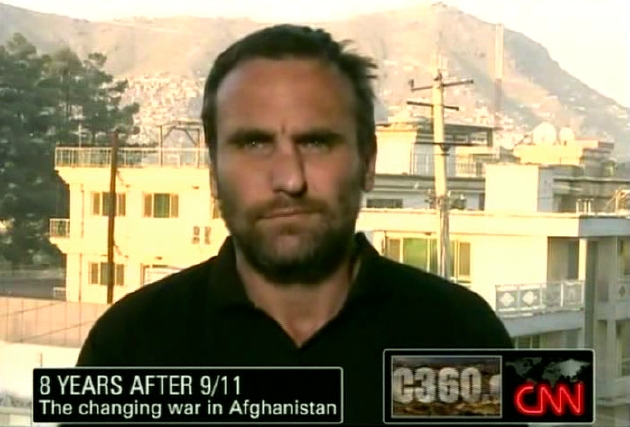AC: "There's no al Qaeda training camps, and there's very little al Qaeda activity."
September 10, 2009

Length: 4:41
LARGE (54.3 MB) ----- SMALL (5.7 MB)
The fourth day of the special reporting from Afghanistan gives us a discussion amongst Anderson Cooper, Peter Bergen, and Michael. It is already 9/11 in Afghanistan, and the discussion centers on what has happened to the search for Osama bin Laden and whether al Qaeda is still active in that country.
ANDERSON COOPER: Welcome back. We're at Forward Operating Base Geronimo in the heart of Helmand province. This is held by the U.S. Marines, who go out on patrol every day. And they're helping retrain the Afghan national army.
We got involved in Afghanistan because of what happened on September 11. We're just a few hours away from the anniversary in the United States. Already here in Afghanistan, it is 9/11.
We wanted to take a look at where is al Qaeda today. You hear politicians in Washington talking about what's happening here as a hunt for al Qaeda. But you don't hear a lot of folks on the ground here talking about al Qaeda. We're going to talk about that with Peter Bergen and Michael Ware.
(BEGIN VIDEOTAPE)
COOPER: Michael, in Washington, you hear this war being presented as a war against al Qaeda, as a hunt for al Qaeda. But here on the ground, you don't really hear much about al Qaeda.
MICHAEL WARE, CNN CORRESPONDENT: Well, that's because this is not a hunt against al Qaeda, Anderson. You don't hear the Afghans in the combat zones in southern Afghanistan or eastern Afghanistan, talking about al Qaeda.
That's why America originally invaded Afghanistan way back in 2001, because al Qaeda was given sanctuary here by the Taliban. America recognized that as a national security threat.
Well, that national security threat is no longer here. It's based in Pakistan. There's no al Qaeda training camps, and there's very little al Qaeda activity.
The bulk of the day-to-day fighting, the bulk of the bombings, the bulk of the shootings, almost all of them are being committed by Afghan Taliban. So this war now is not so much about Osama bin Laden and his al Qaeda network, Anderson.
COOPER: And the Taliban, Peter, is totally different than al Qaeda. I mean, there are linkages, especially in Pakistan. But what's the linkage?
PETER BERGEN, CNN NATIONAL SECURITY ANALYST: Well, I'd say increasingly the Taliban has been influenced by al Qaeda, both ideologically and tactically. The Taliban were a very provincial group of people when they ran this country. But they're talking about the global jihad, they're operating very much like al Qaeda in Iraq. It's an IED war. It's a suicide attack war. So they've moved together ideologically and tactically with al Qaeda, which is part of the problem here.
COOPER: But when -- I mean, is it accurate then for Washington to say that this is a battle against al Qaeda?
BERGEN: Certainly not here in Helmand, Anderson. As we've heard repeatedly, al Qaeda doesn't have much of a presence here. They are more of a problem in eastern Afghanistan. And the calculation is if international forces left, the Taliban would be back, not because, you know, they're so strong but because the Afghan government is so weak. And if the Taliban came back, they would again offer safe haven to al Qaeda.
COOPER: Michael, I guess, that is the argument for the politicians. They say, "Well, look, if Afghanistan, you know, gets weaker, if the Taliban takes over, then this would be a home for al Qaeda."
WARE: Well, that is a possibility. But it assumes an awful lot. It assumes, firstly, that this government will fall apart to such a degree that the Taliban would come back.
Very few people actually can see that happening in the short- to medium-term future. And if you read the latest traffic between al Qaeda and the Taliban, you'll see that there are differences in their messages. And, indeed, one of the most recent Taliban messages stressed Pashtun representation and self-determination as its primary objective.
So the Afghan Taliban are fighting for one thing. Al Qaeda is fighting for another. Al Qaeda is fighting a transnational agenda. The Taliban are not.
And if the Taliban did get a toehold here in Afghanistan again, they probably won't be running the country. And it would be such a risk for them to bring al Qaeda with them. I'm not sure the Taliban goes that far down the ideological road with al Qaeda, especially when you talk directly to these Afghan Taliban -- Anderson.
COOPER: And Peter, the hunt for Osama bin Laden, do we know how active it is? Do we have any sense of the status of it?
BERGEN: It's very active. But since the battle of Tora Bora, in December of 2001, there's been no actionable intelligence about where bin Laden is. There are informed hypotheses that he's in the northwest frontier province of Pakistan in the tribal areas, somewhere up north. But these are important -- these are basically guesses. They're not intelligence.
COOPER: But the U.S. has had more success lately in hitting some of these al Qaeda leaders in Pakistan with drones.
BERGEN: Indeed. I mean, the Bush administration amped up the drone program. There were 34 attacks under Bush in the last year of his administration. There have already been 36 under Obama. So Obama's actually ratcheted up this program, and they've taken out about half the leadership. They've been quite effective.
COOPER: All right. Peter Bergen, Michael Ware, thanks.
